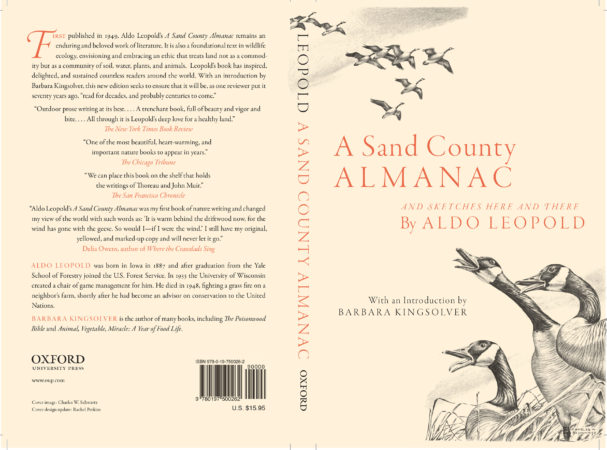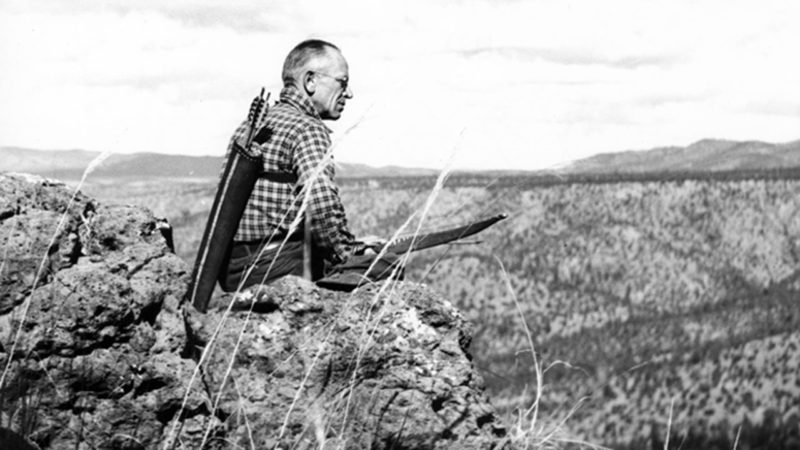Two 1948 books delivered dire warnings and “unleavened gloom” about Earth’s environmental future, and initially outsold Aldo Leopold’s poetic “A Sand County Almanac” after its 1949 debut.
But if you haven’t read “Our Plundered Planet” by Fairfield Osborn or “Road to Survival” by William Vogt, few will judge you harshly. Osborn and Vogt rolled out endless data and depressing examples of poor stewardship to show how mankind was destroying the world, but their books remain in 1950, long since overshadowed by Leopold’s classic.
Scaring readers straight wasn’t Leopold’s style. As his biographer, Curt Meine, wrote, Leopold preferred using irony, humor, science, optimism and insightful storytelling to remind everyone that our conservation impulses require positive fuels like love, respect and connections with nature.

As 1950s conservationists turned to “A Sand County Almanac” for inspiration, Vogt himself conceded people would read it “for decades, and probably centuries to come.”
But at least Vogt’s influence lingers, flirting with the environmental movement’s historical themes. Pity Edward Everett. He awoke the morning after Abraham Lincoln’s two-minute Gettysburg address and knew the president had rendered his two-hour warmup speech irrelevant.
And so it is that three-score and 11 years after “A Sand County Almanac” appeared, Oxford University Press and the Aldo Leopold Foundation in Baraboo are releasing the book’s third edition to coincide with Earth Day’s 50th anniversary, which was April 22.
Some argue this is the book’s fourth edition, but the popular mass-produced paperback version from Ballantine Books in 1966 included seven essays from Leopold’s “Round River,” and its final section wasn’t organized the way Leopold crafted it. Hence, it wasn’t the “classic” edition Leopold conceived.
Either way, “A Sand County Almanac” is available in 14 languages and has sold millions of copies since its release one year after Leopold died fighting a grassfire at age 61.
But the “Almanac” wasn’t an overnight bestseller. Until its 1966 version, it had sold a modest 20,000 copies. Once in paperback and available in nearly every college bookstore in America, the classic exploded with the environmental movement.
Buddy Huffaker, the Leopold Foundation’s president, said the book likely struggled its first 15 to 20 years because its author didn’t live to promote it.
“It lacked that dynamic,” Huffaker said. “Leopold had been prominent in his field, and his book sold in the wildlife and forestry community, but it struggled to find a bigger audience without him. It took Earth Day in 1970 for the world to reassess itself, and find a book with the unique prose and nature messages that captured their ideals.”
Those messages endure 50 years later, writes novelist and conservationist Barbara Kingsolver, who wrote the introduction for the new edition. Kingsolver, author of several New York Times bestsellers, notes that Leopold’s “Almanac” deftly navigates today’s culture wars, even though “environmental news is mostly terrible, and the word ‘environmentalism’ has become a civic hand grenade,” she wrote. “Throw it into a crowd and watch everybody run to opposite sides of the room, arms crossed, glowering.”

But both sides still get Leopold, who helped launch the nation’s first bowhunting seasons in Wisconsin during the 1930s. Kingsolver thinks most folks picture him driving a pickup truck. After all, Leopold hunted and often wrote about hunting, even though it makes some “Almanac” readers cringe.
Kingsolver suggests getting over it, writing: “People who hunt and fish to help stock their freezers are astute naturalists, of necessity, and most farmers are well aware that the fields and forests they steward are home not just to crops but bluebirds and foxes, spring wildflowers and winter wrens. It’s hard to endure ham-fisted judgments against livestock slaughter and crop-spraying from people who have no fields to shepherd or weeds to fight.”
Land Tawney, president/CEO of Backcountry Hunters & Anglers, said Leopold remains relevant to that wide audience because his “Land Ethic” recognizes that all parts matter in nature: “A thing is right when it tends to preserve the integrity, stability, and beauty of the biotic community. It is wrong when it tends otherwise.”
“I think of that quote every time I hunt,” Tawney said. “When I’m hunting ducks, I watch king fishers diving for their food and great blue herons stalking the shallows for theirs. A common purpose connects us. We’re all participants in a larger ecosystem. Leopold captured ideas that never grow old.”
Steven Rinella, a noted writer, conservationist and host of the MeatEater TV show and podcast, said “A Sand County Almanac” so influenced his family that two older brothers, Matt and Danny, focused their careers on ecology and biology.
Leopold continually inspires Rinella to make details fascinating. One such inspiration is chickadee 65290 in the “Almanac.” Leopold wrote that 65290 was the only “chick” of 97 he banded to survive five Wisconsin winters.
“Leopold looked intensely at nature,” Rinella said. “When he watched sawdust flying from an oak, he pictured annual rings getting cut inside the tree, and recalled details of what happened those years in history. It fascinated me that he could get people to read, listen and pay attention to that kind of detail.”
Rinella isn’t surprised by Leopold’s staying power. “Leopold could have written that book today, and people 50 years from now will be reading it and talking about it,” he said.
Likewise, Leopold still resonates with Rinella and other hunters because he was one of them. “He’s legit; he’s not a poser or interloper,” Rinella said. “He talks to hunters about hunting, and he’s first and foremost a hunter himself.”
Tom Heberlein, a retired rural sociologist at UW-Madison, and the originator of organized Leopold readings and Wisconsin’s official Aldo Leopold Weekend each March, said it’s important to honor Leopold’s hunting legacy.
“The idea of tearing the hunter out of Leopold would be like taking his soul,” Heberlein said. “‘A Sand County Almanac’ wouldn’t have the deep appreciation Leopold had for nature without hunting. It’s possible to try, of course, but then it wouldn’t be Leopold.”
The Aldo Leopold Foundation, www.aldoleopold.org, is offering a 25% discount off the new edition’s $15.95 price, and free shipping with the coupon code aldo25.

 By
By 



